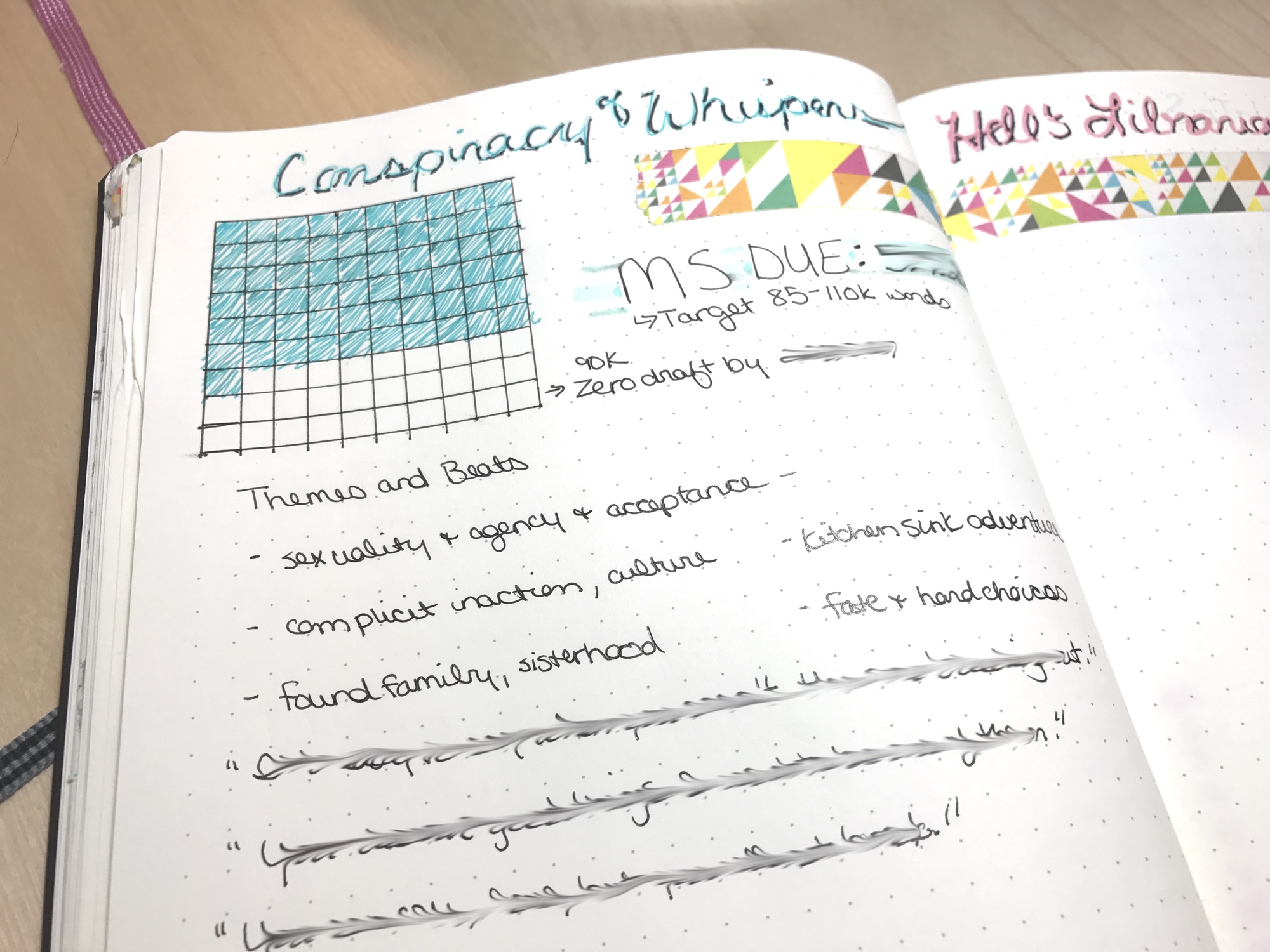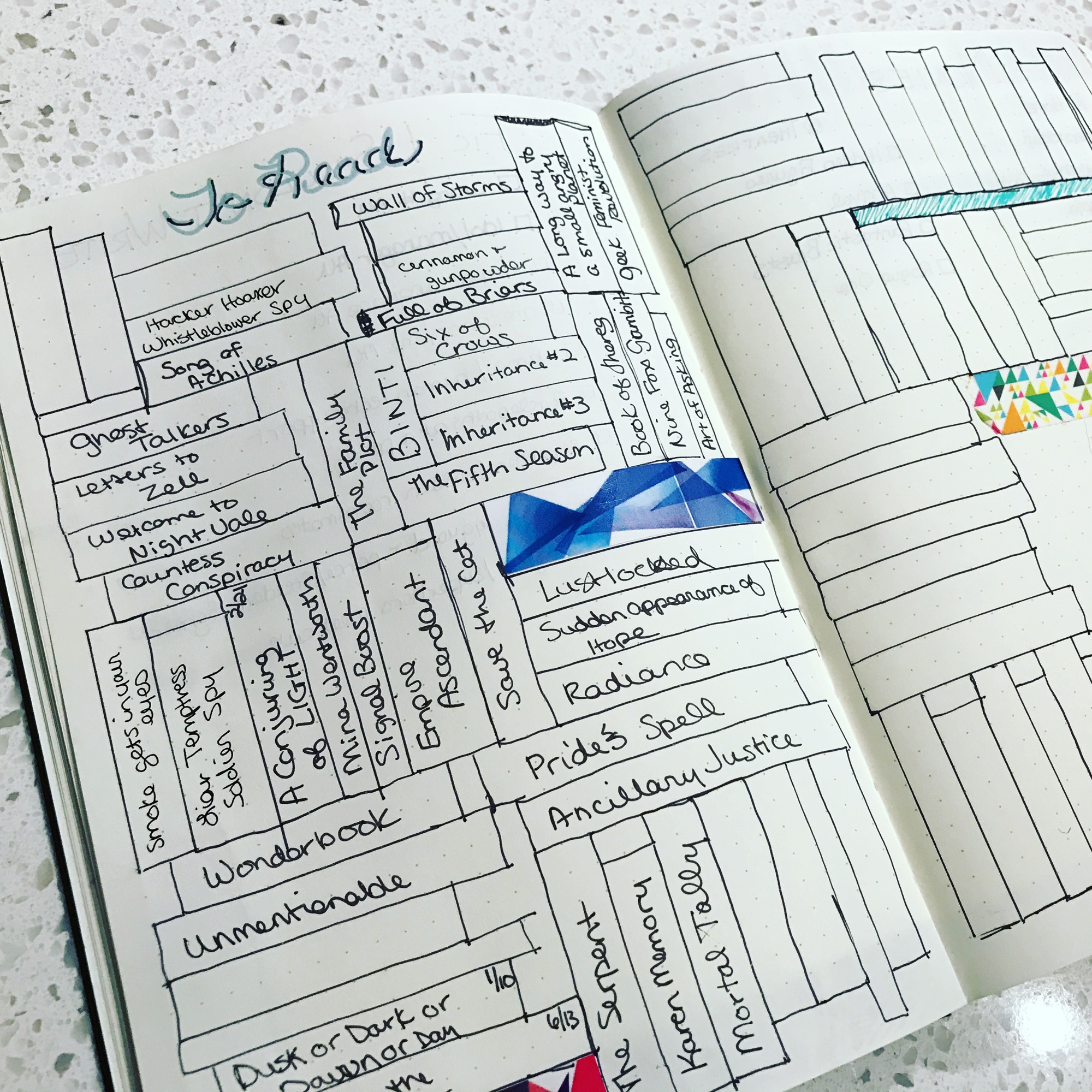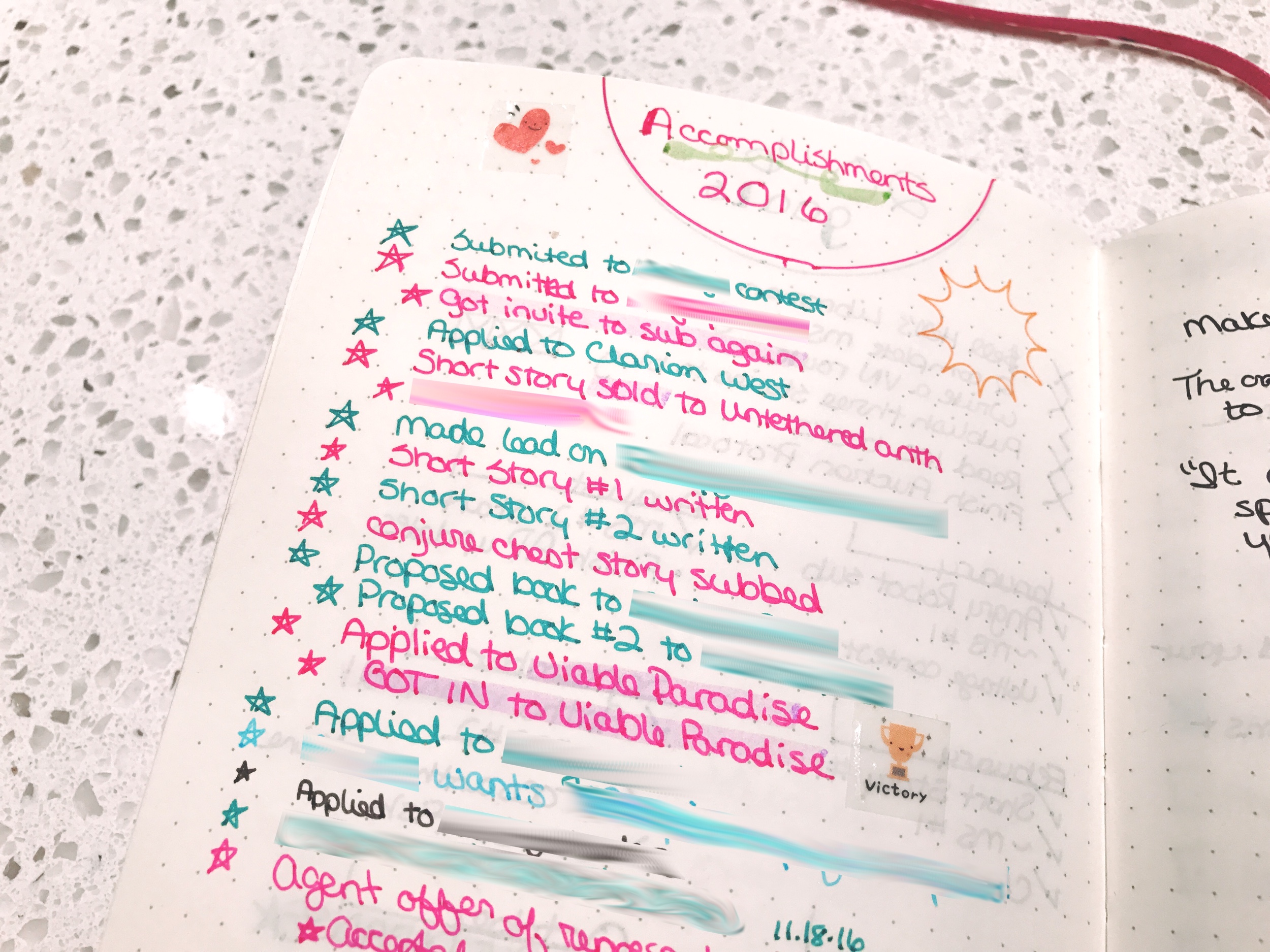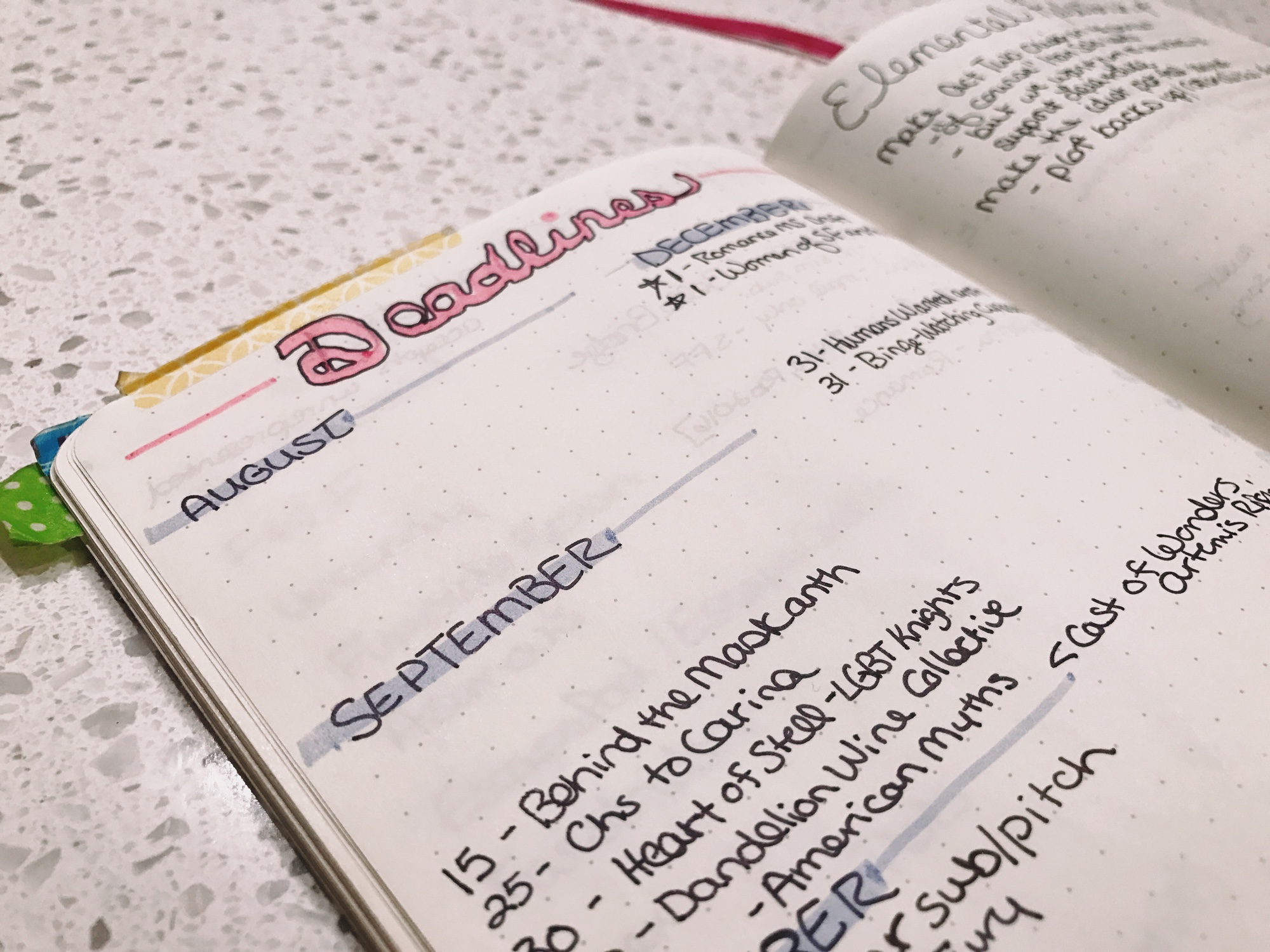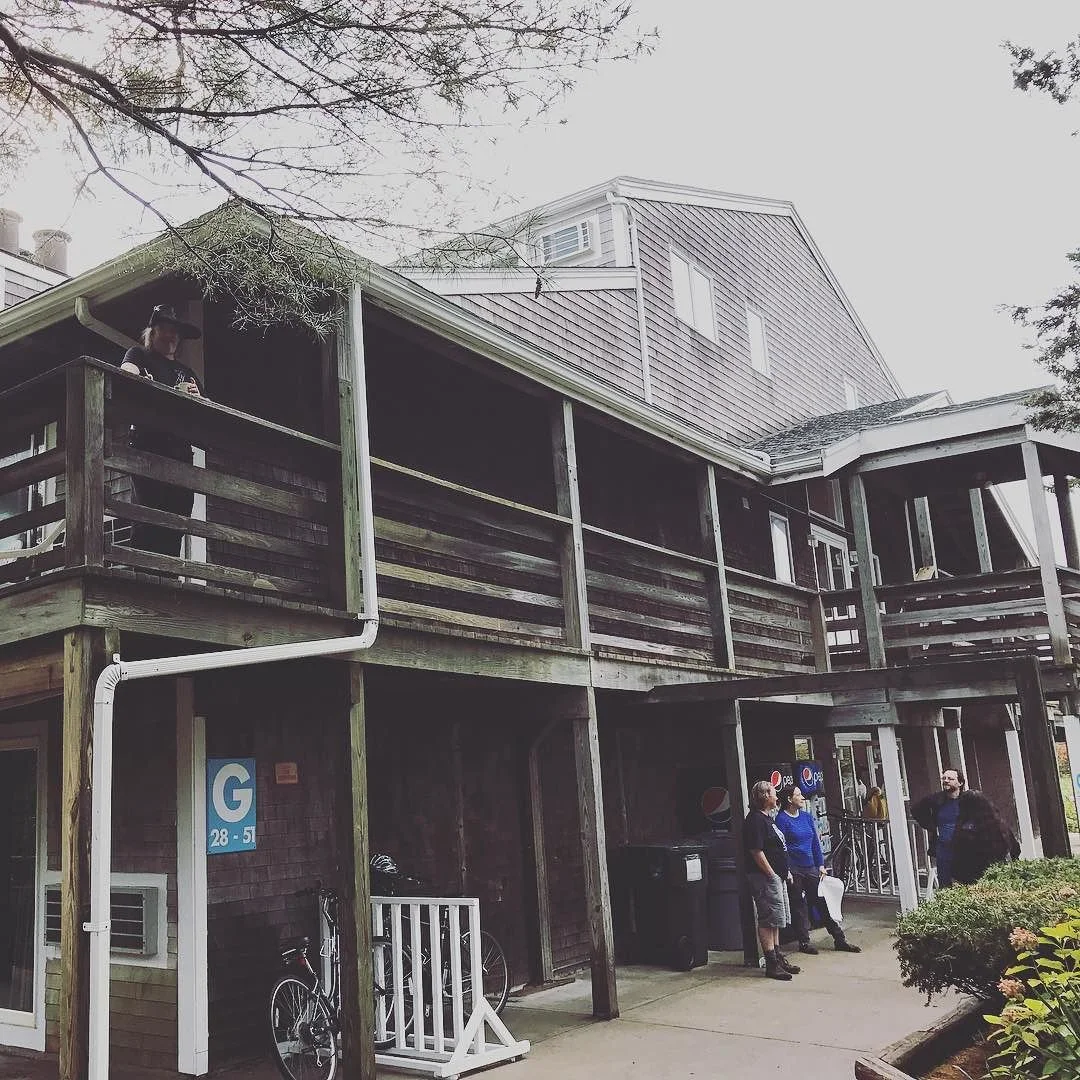Keeping a Bullet Journal for Writers
I loved bullet journaling when I started puttering with it last year, but it took me a while to figure out the custom set-up that works for my freelance, writery needs. The bullet journal community has a huge amount of friendly instagram and tumblr feeds with photos of people’s journal set-ups (much prettier than mine) to help you get started. But the majority of examples I found were generally either students with a schedule full of classes and assignments, or women with a busy family life and multiple commitments.
I’m neither of those.
So I stumbled my way through a few tweaks to the bullet journal set-up with the writer brain in mind, and some writing-specific pages that help me keep my projects straight. It seemed the time of year for setting up plans, so I decided I'd share how my journal is set up, what works (for me) and what doesn't.
A lot of writers are doing end of year publishing or awards eligibility round-ups this time of year. While I'm not quite to that point yet, what I am doing is gearing up for some really exciting writing projects and setting up my new year bullet journal to keep track of all the plotting.
I loved bullet journaling when I started puttering with it last year, but it took me a while to figure out the custom set-up that works for my freelance, writery needs. The bullet journal community has a huge amount of friendly instagram and tumblr feeds with photos of people’s journal set-ups (much prettier than mine) to help you get started. But the majority of examples I found were generally either students with a schedule full of classes and assignments, or women with a busy family life and multiple commitments.
I’m neither of those. I mean, I have commitments, but they’re generally to saintly editors and fictional characters with death wishes. The life of a writer means I have a hundred things to keep track of at once, but not always on a precise day by day itinerary. If I stuck to to the traditional appointments + daily to dos format, my days would be a constant repeat of something like “Write word count, Edit X, read, check email anxiously.”
Which is accurate but not really inspiring or motivating.
So I stumbled my way through a few tweaks to the bullet journal set-up with the writer brain in mind, and some writing-specific pages that help me keep my projects straight. It seemed the time of year for setting up plans, so I decided I'd share how my journal is set up, what works (for me) and what doesn't.
What didn't work for me
I'll get this out of the way first: a lot of the spreads in the starter bullet journal tutorial were just wasted space for me. My bullet journal does not look like most bullet journals. Writing wise, I'm working on large, multi-month projects and while I have milestones I'm trying to hit, those tend to occur on the week or month scale, not daily. Personally, Levi and I keep a pretty chill, child-free lifestyle and manage the occasional appointments and social plans through a shared Google Calendar.
I still use the basic bullet journal structure from the tutorial: an index, a future log, threading and color coding. I still use a weekly spread for to-dos, but since I’ve begun to migrate so many of my daily to-dos to Habitica, I might change that up in the future too. Past that, my set-up gets pretty writer-specific. I'll try to limit myself only to writer-specific tweaks and additional pages here.
Year Goals
The usual bullet journal set-up has a year goals spread, but I had to narrow mine creatively. Figuring out what I want or need to accomplish, creatively, at the beginning of the year helps me keep my twitchy muse on track. I usually try to include an experience goal (input), at least one production goal, a stretch goal, and a fun goal. For 2017, that is shaping up looking like:
- Read 100 books
- Write & finish two novel manuscript drafts
- One blog post a month
- Write a demo or short IF
- Attend two cons
- (try not to panic)
Notice these are all things that are in my control. I have things I would like to have happen this year, sell another book, become a jedi, but I don’t necessarily have control over whether that happens or not. I try to keep focused on goals that mostly rely on my efforts, not outside luck or forces beyond my control. Focusing on those things, fame, success, is crazy-making but so easy to do. I still struggle with it.
Accomplishments
I’m going to take a minute to convince you of the therapeutic benefits of bragging to yourself. Let’s be honest, a writing career is solitary and full of amorphous feelings of progress. I try to acknowledge progress by keeping a totally indulgent accomplishments page. It gets added to every time I publish or sell something, sure, but I also include accomplishments that are in my control: when I submit to Big Scary Thing, or just finish Draft That’s Been Kicking My Butt. It’s a good thing to have and look back on during those days when impostor syndrome is kicking your butt or you’re feeling anxious about your progress.
Look! Even a trashfire year like 2016 can look better with a colorful list of bullet points.
some text blurred for Reasons(tm)
Manuscript Status Page
Every manuscript I work on gets an official status page in my journal. This isn’t the page that will hold EVERYTHING about the book (that’s a series bible and a totally different project for me), but I make a little grid to color in as a progress through the first draft, include important deadlines and due dates, and include a few notes on the themes of the book and central Big Ideas I don’t want to forget during the swampy middle of drafting. It’s a page I check into occasionally, to update or just remind me why I wanted to write the book in the first place.
Bonus: filling in those 1k squares is very satisfying.
Writer Toys and Tools pages
Honestly, these lists fill up the bulk of the front of every bullet journal I start. Some of the most useful pages for me are the pages where I keep running lists of ideas, notes, concepts that I want to work into a story someday. Just a few of these pages include:
- Short story ideas or prompts — niggling ideas or stories I want to write someday. If I need a small project or inspiration for a short story exercise, I turn here.
- Blog articles or tumblr posts — Ideas for blog posts and articles that I will probably not get around to writing because I’m a bad blogger, but it feels good when I get to check one off.
- Fanfic ideas - Because I’m a nerd and fanfic is awesome. (I separate these ideas from short story ideas, because they tend to be more situational—not sure why.)
- Name lists—feminine names, masculine names, non-gender specific names, family/place names, creature names, and so on.
- Character tells - little ‘how does your character respond’ opportunities ('i.e., “is your character the type of person to strike up a conversation with a wrong phone number?”) that I can use in future stories
- Archetypes - Archetypes is totally the wrong word, but I keep a page of ‘general types of characters or character ideas I haven’t written yet but would like to some day.’ Whenever I see a character in a movie or series that’s awesome, I try to a) figure out the essence of the personality and what makes it so interesting to me and b) sketch that down so I can play with it in the future. These are really just crumbs of a type than full characters (e.g., someday, I want to include a ‘cinnamon roll Slytherin-esque character' or 'lovable scammer-mentor a'la Reigen from MP100').
- Word morgue - specific words, turns of phrase, or descriptive whatevers that I stumble on and I want to seed into my writer brain for use in the future. Usually this is precious poetic darlings that get killed/edited in current drafts but could be revived in the future. Or just a fun word. Words are fun.
- Writer lies - Writer Lies, if you aren't familiar, are lies writers tell themselves in order to get through a draft, project, or writing sprint. Love and cherish your writer lies. It’s the lies we force ourselves to believe in order to shut down the internal editor/slacker and get to the bravery and business of writing. I keep a list of mine to remind myself on those days when it’s just really, really hard to believe in what I’m attempting.
- Seed pages / Notes - A snatch of dialogue. A great quote. An urban myth or biology factoid about herbivore vs carnivore behavior. If it’s something useful that might fit into a plot someday, it goes on these pages. Notes from any talk, article, or documentary go in here too.
- Plotting - I use a lot of pages trying to convert a jumbled list of scenes/events into an orderly chapter list with firm POVs.
- Industry stuff! - Short story markets by genre. Publishers or agents. Awards deadlines. Workshop deadlines. Etcetera and so on.
Tracking
Your mileage is going to vary on this. Tracking stresses out some people. I don't like tracking habits, but I love tracking things. I track books, television shows, manga, writing habits, etc. It is a fun way to look back on the year, and also it helps me remember to do things other than work when my writing is starting to drag.
- Words written - I tried a couple different ways to do this, but eventually settled on just ticking boxes on my weekly page for every 500 words I wrote. I want to try a more dedicated format that would let me figure out the time of day/environment/etc that I write best in, but filling a tiny word count gauge is enough for now.
- Books to read - Because of course. I also track these on GoodReads but I like having it in my notebook. This year I set a goal of 100 books to read and am slowly coloring in book-ish rectangles (because I can't draw).
- Fanfic read - Last year, I realized I set goals for books to read, but any fanfic I read was lost to the ether. This year I wanted to track the really, really good fanfic I read. Useful for future recommendations.
- Even more media pages - Pages for television series, movies coming out, video games, visual novels, manga, podcasts, etc. I go a little over-board with it, but I enjoy seeing at the end of the year what I liked or didn't. Also helps for when friends ask for recommendations later.
Your Mileage May Vary
Advice on bullet journals and, of course, writing is highly variable but there you go. The coolest thing about the bullet journal set up is flexibility--try a layout or list and it doesn't work? Try something else on the next page. Ultimately, the best system is whatever gets more words down on the page, and I'd be psyched to hear what's worked for you.
Grief as a Superpower
It's a weird time, so I'm gonna do a weird thing. I’m going to talk about anxiety.
Yes, this election was tragic. There's a hundred articles today talking about things that people of color and the LGBTQ+ community has known all along and the rest of us are just learning hard lessons about. And many more filled with good, solid, practical advice on how to fight back. You should go, read all of those. I'll wait. Most acknowledge what many of us are feeling, but the assumption is the feeling is a fleeting part of the process—the weakness before we get to work.
I think I’ve decided the feeling is the work.
It's a weird time, so I'm gonna do a weird thing. I’m going to talk about anxiety.
Yes, this election was tragic. There's a hundred articles today talking about things that people of color and the LGBTQ+ community has known all along and the rest of us are just learning hard lessons about. And many more filled with good, solid, practical advice on how to fight back. You should go, read all of those. I'll wait. Most acknowledge what many of us are feeling, but the assumption is the feeling is a fleeting part of the process—the weakness before we get to work.
I think I’ve decided the feeling is the work.
I spent last night like many of my friends. Nervous but moderately hopeful through out the day. Concerned, then shell-shocked as the results rolled in. Then I spent about twenty minutes soaking my partner’s shoulder with tears, sobbing out my fears. And then just as abruptly I needed to write. I needed to write, the fits and starts of thoughts that I’ll probably not finish but needed out of my head. And with it came a flood of feelings:
The shock and the rage. Of realizing we chose the predator over the champion. The fear over the fight. I live in a country that would rather elect a molester, misogynist, and a racist than an imminently qualified woman. Or any woman. She will never be enough. Not presidential enough, not ‘likeable’ enough, not trustworthy enough. I, my gender, may never fucking be enough in my lifetime. (But we will be. We will be.)
The self-blame and doubt. That I didn’t speak up loud enough, often enough. That I said less than I should. Because I wanted people to like me. Because I didn’t want to offend my relatives or argue on Facebook. Sure, I was progressive—but never so far as to be unfashionable in my circle. And I deserve to be judged for that.
The revulsion. That the votes of white women, in specific, were a major factor in this.
The fear. For things I can only hope won’t happen. For my friends with more brown in their skin than me. For the teenage relatives I love who are gay and isolated and facing the repeal of laws that protected them. For me and my husband who will never get health insurance without the ACA. For my self-employed and creative friends who will never realize their creations without the safety net of the ACA. For my disabled friends who worry about the erosion of the ADA. For my trans friends scrambling to get passports with the right gender before they can’t. For my female friends who are suddenly having to consider whether it’s prudent to spend these last two months getting emergency IUDs and stockpiling plan B pills like some of my relatives stockpile guns. Because, let’s face it, if the government ‘comes for’ one of those, it’s not going to be the guns. It was never going to be the guns.
(And the anger, again, because if you voted for Trump then yes, fuck yes, that is exactly what you voted for and I can not be okay with that.)
The guilt that, despite being bisexual, I’m pretty damn safe. I’m a white woman in a hetero marriage, moderately affluent and in one of the most progressive cities in the country in a solid blue state. The most personal risks to me are mostly healthcare and the economy. I’ll most likely be ok. But the people I love—my friends, my family, some who even voted for Trump—may not.
I’m still trying to come out the other side of all of that. I’ve spent a lot of today talking with friends, taking are of each other. But I know what’s on the other side of it.
This is fuel.
There’s an amazing scene in Alice Isn’t Dead, a podcast audiodrama, that I’ve been thinking about all day. The main character, Keisha, is a woman looking for her missing girlfriend. Along the way, Keisha also deals with crippling anxiety along with the terror she survives. She feels anxiety, realistically struggles to operate with it. At the climax of the story, she’s trapped in a room with the monster that’s ruined her life, who is inhumanly strong and has the power over her in every regard. And she is afraid; she is overwhelmed with it. Of course, that's when she has the realization that she can use her anxiety, harness it:
And through all of these thoughts, a buzzing anxiety. Anxiety like electricity. And I knew, in that moment, that anxiety is just an energy. It is an uncontrollable near-infinite energy, surging within me. And for once I stopped trying to contain it.
I told my heart, beat faster. I told my panicked breath, become more difficult, and I told my fear to overtake me. Make me more afraid. I am not afraid of feeling afraid. Make me more afraid! All of that energy, I turned it outward. I pushed it into my arms, my legs, my teeth. Fuck the Thistle man! When he hit me, I hit back. He was stronger than I remembered. It was like being hit by a car. Mass without pity, just brutal physics. But I was hitting, too. Pounding at his face, his chest, biting, throwing myself into him. I didn’t feel pain. I was so full of fear that there wasn’t any room for anything else. I fought using every wave of terror inside of me.
I'm not afraid of feeling afraid.
We’re processing our feelings right now, and the next step is not to get past them, to forget them, it’s to harness them.
I can't tell you what to do with your feelings right now. Maybe the smartest thing to do with your feelings right now is self-care until it's safe again. But maybe you are feeling like me, and desperately want to not feel helpless. I want to feel afraid and therefore protect. I want to feel revulsion and anger and stop giving passes to our bigoted families in the name of approval. I want to take the guilt I feel for not saying enough and speak clearer. And more importantly, lift up the real voices of others.
I’m not always going to succeed at that. I can guarantee there will be times I suck at it because I have an innate midwestern girl impulse to be liked that I'm still trying to unlearn. But I’m going to try, using words which is the best weapon I have—maybe your weapons look different. I’m going to try. Because I’m scared and I’m guilty and I’m sad and I’m horrified and I’m angry.
Emotions get a bad wrap. We’ve been told that cold logic is better. Feelings are too feminine, too messy. Some might try to convince us in the coming months that we didn’t really feel them. That these feelings are getting in the way. That we should leave the feelings of today aside. Forget that.
Take the feelings. Sure, we're raw right now and time will ease some of it. But feel what you need to feel right now, then decide what it fuels.
Feelings are not our weakness. They’re our superpower.
and we need you.
Viable Paradise review: Horrors and Feels
Last week I attended Viable Paradise, a workshop for writers of science fiction and fantasy held each year in Martha’s Vineyard. Part of the research before applying to Viable Paradise included the inevitable googling for alumni and reviews. Viable Paradise’s reputation was generally glowing, but one theme that popped up over and over again and dominated reviews was the sense of community and friendship. How welcome students felt, the friends they left with.
After reading the eighth one I think I audibly scoffed. Friendship? Touchy feely shit? That’s all well and good, guys, but tell me what you really got out of it! I am a serious, hungry writer. Tell me about the hard hitting critiques! The inside information! The famous instructors! The Craft! You can make friends anywhere, right? I didn’t get it.
I get it now.
Last week I attended Viable Paradise, a workshop for writers of science fiction and fantasy held each year in Martha’s Vineyard. Part of the research before applying to Viable Paradise included the inevitable googling for alumni and reviews. Viable Paradise’s reputation was generally glowing, but one theme that popped up over and over again and dominated reviews was the sense of community and friendship. How welcome students felt, the friends they left with.
After reading the eighth one I think I audibly scoffed. Friendship? Touchy feely shit? That’s all well and good, guys, but tell me what you really got out of it! I am a serious, hungry writer. Tell me about the hard hitting critiques! The inside information! The famous instructors! The Craft! You can make friends anywhere, right? I didn’t get it.
I get it now.
At the introduction of the week, it was stated clearly: the workshop wouldn’t teach you anything you couldn’t learn elsewhere eventually. It only sought to speed up your process, to get you there faster and writing the stories and in the way only you can do it.
And it’s true. Here’s the thing. Viable Paradise is an intense, high level workshop that puts students through a level of instruction and critical thinking that many unpublished authors haven’t been exposed to yet. The lectures are incredibly useful, the feedback is equal parts eye-opening and encouraging.
The bones of the workshop are excellent. The VP instructors range from chart-topping best selling authors to editors who have shaped the industry. The lectures and collegiums (colloquiums!) taught me things that have changed how I write. I had so many little moments where things clicked during talks on character, on plotting, on exposition, on critique, and, above all, life in the industry and writer self-care. And I will tell you, one of the most heartening experiences in the WORLD is having a professional you admire read and enthuse about your modest work.
But here’s the thing: Viable Paradise, at least for me, was not ultimately about the instructors, or the lectures.
It was about the class of writers.
A gift from last year's class.
Writing is, ultimately, a chosen profession you must do alone. Aside from a co-writer or editor, no one will write the words for you. The reality of writing is spending a LOT of time alone and that sometimes results in feeling DISTINCTLY alone. Isolation. So the powerful, transformative, shit-did-that-week-just-happen effect isn’t from an author sitting you down and teaching you That One Weird Trick Publishers Don’t Want You To Know(tm). It’s not even about learning better techniques for characterization and plotting.
It’s the induction into a collaborative and supportive community of professional authors. Authors with a jaw-dropping amount of talent, experience, backgrounds, techniques, wisdom and advice that you don’t just have access to for one week in October—it’s in your toolbox for the rest of your career. It’s the crucible of a week that forms twenty-four strangers with talent and potential into a ragtag Leverage-style team. And the crucible is a composition of some surreal moments.
- It’s when sixteen writers converge on a room with tea and chocolates and write in (mostly) silence until after midnight.
- It’s struggling to write a horror story when you don’t write horror stories until your roommate gives you the PERFECT background piece of horrific historical data that makes it all click. (Thank you again, Wren.)
- It’s the Horror that is Thursday that is most definitely a Horror and no sir, I was not told to say that and I am definitely not a Thing(tm).
- It’s marinating in a week of writer culture where all you do is eat, sleep, breathe and drink (oh so much drink) the challenges of a Damn Good Story until it’s coming out your pores.
- It’s finishing off the week by escaping with a few other classmates to watch the Hamilton documentary and realize how universal the effing creative pursuit to Do The Thing is.
- It's talking about Writer Anxiety and Wordcount Insecurities and having writers of all ilks and career successes look at you and nod with a pained, immediate understanding. And then getting damned good advice on it.
- It’s staying up late and getting up early to read, and critique, and write, and write some more because you just need to capture this magic in a bottle while you can.
- It’s realizing that your stories may not be for everyone, even not for That One who you foolishly wanted to impress, but then it was for That Other One, holy shit, and learning to filter between all those reactions and critiques is an on-going process.
- It’s also folk songs and guitars, and martinis and Berger cookies, and broadway lip sync battles and night beach expeditions to see moon jellies.
- It’s being a little proud of all the moments your introvert self caught, even as you missed a bunch more because you had to sleep sometime.
- (It frankly, all starts when you get your acceptance letter and suddenly have dozens of alumni from previous years reaching out to cheer you on and welcome you into the fold on Twitter. That’s when I knew this was Something Different(tm).)
- It’s riding the roller coaster of “I suck — no, wait, this sucks — forget it, I’m not like you — No, I’m JUST like you — wait, maybe I can do this” and ultimately deciding yes, your stories are worth it, worth not getting impatient and half-assing, and worth taking the time and resources to do damn well.
- It’s finding people who are just as creative and with the same box of anxieties and dreams and WEIRD as you and somehow surviving the damn thing so you can go on and take on the Thing together.
So, yeah. I joked before going to Viable Paradise that it was like Writer Hogwarts, a Writer Summer Camp, and I wasn’t that wrong. You’re taught some of the magic while you’re there, make-up a LOT of it with your classmates while fighting Voldemort, sure.
But the rest? That other 80% of the magic? It happens after the goodbyes are said, this story happens after the book ends.
And dammit, now I got the crew to make it a good one.

